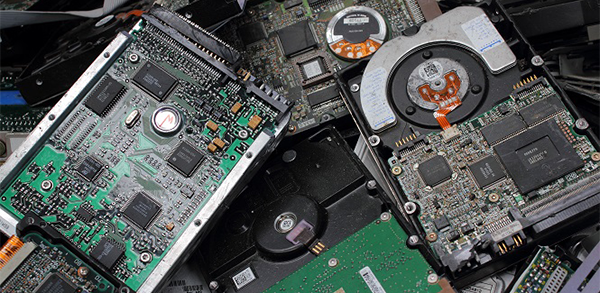
Electronic waste, or e-waste, is a growing problem that isn’t showing signs of slowing down anytime soon. There is no current federal law that requires everyone in the U.S. to recycle their electronic devices, however each state is given the power to establish their own laws regulating e-waste. As of now, more than 20 states have passed laws related to e-waste, but so far, they’ve found that the current laws are not enough to control this problem.
A Look At States’ E-Waste Laws
The laws that are place vary from state to state, with some being more restrictive and effective than others. Rhode Island is one state that attempted to implement strict e-waste laws in 2015. The law that was passed required electronics manufacturers to pay for every Rhode Island resident to recycle five pounds of their e-waste. It’s a good idea in theory, but unfortunately, the state soon realized that residents had way more e-waste than they originally thought. By the end of the first quarter of 2015, electronics manufacturers had already fulfilled their requirement of paying for the recycling of five pounds of e-waste per resident. As a result, they no longer had to pay to recycle residents’ e-waste, which left the people of Rhode Island confused as to what to do with their old electronic devices.
New York is another state that passed a law with the intention of solving the e-waste problem. The law in New York forced electronics manufacturers to offer mail-back programs that met certain requirements to residents in the state. The idea was that consumers would be able to mail their old electronics to electronics manufacturers, who would then be responsible for recycling it. However, the idea backfired because of loopholes in the law. New York residents were more than happy to participate in the mail-back program, however they were mainly sending small electronics that were easier to ship. Then, residents left large electronic devices such as computer monitors and TVs at local recycling centers. The problem with this is it is very expensive to recycle large electronics because unlike smartphones, the parts of large devices cannot be extracted and resold. Therefore, the electronics manufacturers were getting all of the valuable e-waste, whereas the city was left the e-waste that was difficult and expensive to recycle.
How to Fix E-Waste Legislation
Clearly, there is still work that needs to be done in order to pass laws that are more effective. How can states ensure that their laws will work as intended? Here are a few ways:
Reward Manufacturers For Designing Better Products
None of the current laws address the real problem: manufacturers will continue to produce more and more electronic devices to meet the growing consumer demand, which will lead to more e-waste year after year. As long as manufacturers are going to continue to produce new products, states should reward them for tweaking their designs to make the products more recyclable.
How could manufacturers be rewarded? Right now, some states determine how much each manufacturer is required to recycle on behalf of customers based on the company’s total weight of sales. But, this system is flawed because it rewards manufacturers that make light weight products instead of rewarding them for making products that can be easily recycled. Therefore, states need to update these laws by setting each manufacturer’s requirement based on the recyclability of their products, not on the volume sold.
Make Recycling Mandatory
Like the New York law mentioned above, many of the states have passed legislation that allows the electronics manufacturers to control which devices they have to recycle for their customers. When given this option, electronics manufacturers are obviously going to choose the devices that have some value and are easier to recycle, leaving the more difficult items with the city recycling plants. To prevent this costly problem, laws must be passed that do not give manufacturers the power to choose which devices they collect from their customers. This must be done so cities are not forced to pay to recycle large electronics that are not collected by manufacturers.
Think Long-Term
Most of the laws that are in place require customers to mail their unwanted electronic devices into the manufacturer in order to participate in the program. However, many consumers may not be willing to put in this much of an effort just to recycle one of their old devices. Or, consumers may do it once or twice and then stop when they realize how inconvenient it is to mail something to be recycled. To fix this problem, states need to start thinking long-term. Instead of forcing electronics manufacturers to engage in these mail-back programs, states should be requiring them to pitch in to cover the costs of permanent recycling facilities. If there were more local recycling facilities that could process e-waste, more people would probably choose to recycle their old electronic devices.
States should also consider requiring that electronics manufacturers launch awareness campaigns that are designed to inform consumers of the dangers of sending e-waste to landfills. Many people don’t understand why recycling their electronics is so important, so providing them with this information may be enough to convince them to start recycling on their own. Both of these ideas would offer long-term solutions to the growing e-waste problem.
Even if it’s not required by law, it’s strongly recommended that you recycle your electronic waste instead of sending it to a landfill. It may not be a legal obligation to do so, but it is in the best interest of the environment and society as a whole. For more information on our e-waste recycling services, or to request a quote from ERI for your e-waste needs, contact us today.